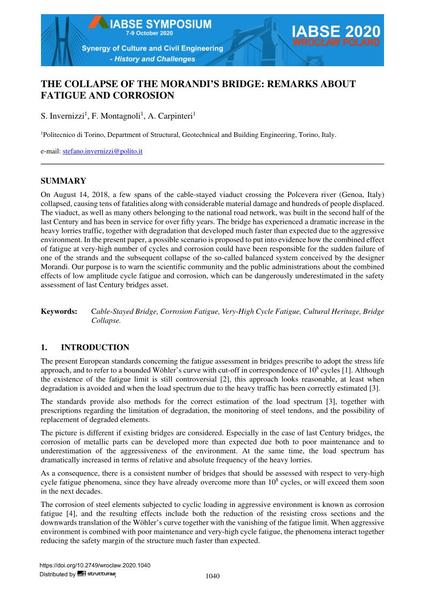The Collapse of the Morandi’s Bridge: Remarks About Fatigue and Corrosion

|
|
|||||||||||
Bibliographic Details
| Author(s): |
S. Invernizzi
F. Montagnoli A. Carpinteri |
||||
|---|---|---|---|---|---|
| Medium: | conference paper | ||||
| Language(s): | English | ||||
| Conference: | IABSE Symposium: Synergy of Culture and Civil Engineering – History and Challenges, Wrocław, Poland, 7-9 October 2020 | ||||
| Published in: | IABSE Symposium Wroclaw 2020 | ||||
|
|||||
| Page(s): | 1040-1047 | ||||
| Total no. of pages: | 8 | ||||
| Year: | 2020 | ||||
| DOI: | 10.2749/wroclaw.2020.1040 | ||||
| Abstract: |
On August 14, 2018, a few spans of the cable-stayed viaduct crossing the Polcevera river (Genoa, Italy) collapsed, causing tens of fatalities along with considerable material damage and hundreds of people displaced. The viaduct, as well as many others belonging to the national road network, was built in the second half of the last Century and has been in service for over fifty years. The bridge has experienced a dramatic increase in the heavy lorries traffic, together with degradation that developed much faster than expected due to the aggressive environment. In the present paper, a possible scenario is proposed to put into evidence how the combined effect of fatigue at very-high number of cycles and corrosion could have been responsible for the sudden failure of one of the strands and the subsequent collapse of the so-called balanced system conceived by the designer Morandi. Our purpose is to warn the scientific community and the public administrations about the combined effects of low amplitude cycle fatigue and corrosion, which can be dangerously underestimated in the safety assessment of last Century bridges asset. |
||||
| Keywords: |
cable-stayed bridge cultural heritage bridge collapse corrosion fatigue Very-High Cycle Fatigue
|
||||
